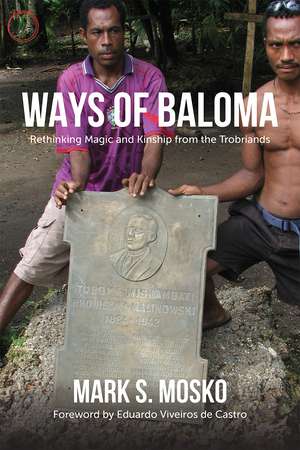Ways of Baloma: Rethinking Magic and Kinship From the Trobriands: Malinowski Monographs
Autor Mark S. Moskoen Limba Engleză Paperback – 7 dec 2017
Informed by a synthesis of Strathern’s model of “dividual personhood” and Lévy-Bruhl’s theory of “participation,” Mosko upends a century of discussion and debate extending from Malinowski to anthropology’s other leading thinkers. His account of the intimate interdependencies of humans and spirits in the cosmic generation and coordination of “life” (momova) and “death” (kaliga) strikes at the nexus of anthropology’s received wisdom, and Ways of Baloma will inevitably lead practitioners and students to reflect anew on the discipline’s multifold theories of personhood, ritual agency, and sociality.
Preț: 212.32 lei
Preț vechi: 250.99 lei
-15% Nou
Puncte Express: 318
Preț estimativ în valută:
40.63€ • 42.53$ • 33.81£
40.63€ • 42.53$ • 33.81£
Carte indisponibilă temporar
Doresc să fiu notificat când acest titlu va fi disponibil:
Se trimite...
Preluare comenzi: 021 569.72.76
Specificații
ISBN-13: 9780997367560
ISBN-10: 0997367563
Pagini: 516
Ilustrații: 44 halftones
Dimensiuni: 152 x 229 x 41 mm
Greutate: 0.73 kg
Editura: HAU
Colecția HAU
Seria Malinowski Monographs
ISBN-10: 0997367563
Pagini: 516
Ilustrații: 44 halftones
Dimensiuni: 152 x 229 x 41 mm
Greutate: 0.73 kg
Editura: HAU
Colecția HAU
Seria Malinowski Monographs
Notă biografică
Mark S. Mosko is professor emeritus in the Department of Anthropology in the School of Culture, History, and Language at the College of Asia and the Pacific at the Australian National University.
Recenzii
"Bronislaw Malinowski's work on the Trobriand Islands of Melanesia is still respected, though not sacrosanct, a century after he conducted it. Succeeding anthropologists amplified or challenged his analyses and investigated areas he overlooked. Annette Wiener, for example, focused on the neglected topic of gender and Trobriand women in Women of Value, Men of Renown (1976). Mosko is the most recent Trobriand ethnographer, and the most comprehensive. He investigates the role of magic in the present, animated by Malinowski's recognition that magic infused every area of Trobriand life. Nine chapters cover classic topics such as cosmology, mortuary ritual, reproduction, taboo, rank, kinship, marriage rules, and chiefly succession. Mosko generously acknowledges his Trobriand collaborators and the Trobriand work of other anthropologists. Most importantly, his research demonstrates the way that a century of anthropological theory and research, along with changing contexts and interpretive frameworks, have allowed new insights about Trobriand kinship, personhood, magico-religious beliefs, Christian conversion, and the relationship between humans and spirits. The author concludes that traditional beliefs and practices surrounding kinship and magic have remained material to Trobriand life through a century of colonial and postcolonial transformation. This important book is mandatory for all four-year and university research collections. Essential."
"In this impressive volume, Mark Mosko provides an in-depth critique of Malinowski’s perception and articulation of life in Northern Kiriwina, Trobriand Islands, Papua New Guinea. . . . In this ethnographically and analytically rich and complex work, Mosko shows the composite character of both persons and spirits, of shadows, images and powers, and their timeless interrelationship through kinship. A short review cannot do justice to this magnificent volume. . . . Mosko’s aim to dig meticulously into cosmogonic and cosmological foundations of conceptualcum-practical existence of Trobrianders required complex in-depth discussions with those who are guardians of such a knowledge and capable of reflection. Together, I would say, they fully succeeded."
“The Trobriand Islanders are one of the most thoroughly studied societies in the world. Is it possible, though, that after a century of fieldwork by some of anthropology’s most illustrious figures, including Annette Weiner and the master Bronislaw Malinowski himself, there is still much that has been misunderstood or overlooked? Mark Mosko makes a convincing case that some core aspects of Trobriand culture have eluded us and that comprehending those aspects solves major questions or mysteries in Trobriand ethnography.”
"In this important volume, Mark Mosko presents a reinterpretation of some of the key tenets of Trobriand social organization, delivered as a direct challenge to much of the classic ethnographic analyses of this 'sacred place' in anthropology's canon. . . . This is undoubtedly an important addition to the corpus not only of Trobriand ethnography, but to the discipline as a whole. . . . Sure to be required reading for scholars of the Massim region and Melanesia/Oceania more broadly, as well as those interested in exchange, sacrifice, kinship, magic, and social organization."
"Mark S. Mosko distinguishes himself as one of the leaders of contemporary Pacific anthropology. . . . With compelling theoretical and conceptual reflections, as well as twenty-first century ethnographic and analytical ambitions, Ways of Baloma is a remarkable work worthy of the classics. . ."
"Challenges prevailing anthropological representations of Trobriand life. . . . It is a fitting culmination of [Mosko]’s anthropological corpus and a splendid example of what our hyper-productive Emeriti can do in retirement. Echoing a canonical Trobriand botanical idiom, I declare that the base has risen through the body to the tip and has borne fine fruit."
"Ways of Baloma is thick description articulated through one of the most sustained theoretical discussions our times allow. . . . This book is an anthropology as it was meant to be, intense scholarship and searching ethnography. For these times it is gripping in its level of interaction between the analyst and his subjects. . . . As we all know, one of the marvels of Malinowski’s work was that for decades people could make arguments with it somewhat askance to Malinowski’s own theoretical commitments. For some anthropologists, this quality became the standard to replicate: create a coherent argument with a rich body of data and then let time do the re-telling. By this standard Mosko has created a sequel to Malinowski’s ethnography. This work is rich enough to be handled somewhat differently by different yet sympathetic readers."





